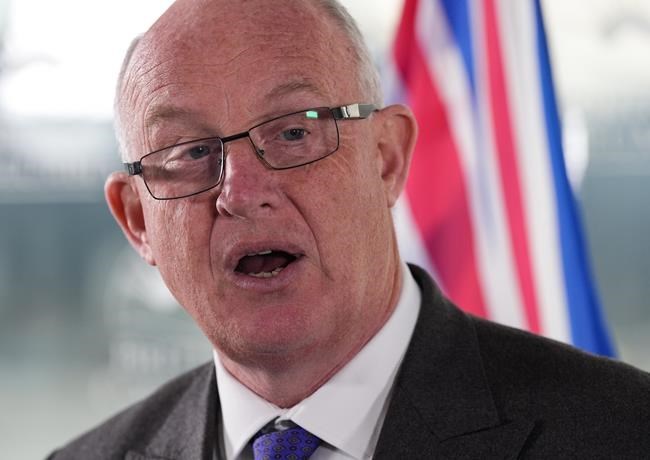
B.C. Deputy Premier and Minister of Public Safety and Solicitor General Mike Farnworth speaks during a news conference, in Vancouver, B.C., Monday, April 11, 2022. THE CANADIAN PRESS/Darryl Dyck
Republished September 21, 2022 - 5:42 PM
Original Publication Date September 21, 2022 - 2:41 PM
VANCOUVER - The British Columbia government is moving to immediately implement some of the recommendations of a report on repeat offenders and random crime, whose authors describe a phenomenon causing “incredible distress” in many communities.
The province hired former Vancouver deputy police chief Doug LePard and Amanda Butler, a criminologist specializing in mental health and addiction, this year to investigate how best to prevent the cycles of crime.
There are more than two dozen recommendations in their report that was released Wednesday and is aimed at the provincial prosecution service and the courts.
The report says hardline enforcement is not the answer and it isn’t sustainable for police to continue to bear the main responsibility for managing prolific offenders.
Public Safety Minister Mike Farnworth said the government will immediately begin to act on the report, starting with the return of a prolific offenders management program.
It will also create a system to co-ordinate plans for those with mental health and substance use needs who come into conflict with the law, and will implement a First Nations pilot program to address repeat offenders, he said.
"There are no recommendations in this report that are completely off the table," Farnworth said.
"We will now be taking those recommendations and are doing a deep analysis of them. That's why we've asked for the report and we also await the final report coming later this month."
Attorney General Murray Rankin said solutions will be expensive to implement properly and that will need to be factored into next year's budget.
"There'll be budgetary consequences as a result of this, and so we look forward to speaking with our colleagues at Treasury Board and (with) the minister of finance to make sure we can get the resources that are needed," he told a news conference Wednesday.
The report recommends that the BC Prosecution Service conduct an internal review to consider increasing the use of “therapeutic bail” orders for people with mental health and substance use needs and delay sentencing while a person undertakes treatment.
It also calls for every provincial court to be assigned a forensic psychiatric nurse to allow for immediate client assessments that could allow for the diversion of the accused to other specialized court settings.
However, the report says police enforcement, aggressive prosecution and longer sentences won’t address the problem.
“Furthermore, long-term reductions in crime require that the provincial government invest significantly in addressing the systems-level issues that contribute to offending including systemic racism, poverty, inadequate health services, food insecurity and housing unaffordability," it said.
The study noted that overall crime was trending down, but LePard, who co-authored the report, said official reported crime statistics may not provide an accurate picture of crime trends in B.C.
Random violence and crime by repeat offenders has dramatically risen since the start of the COVID-19 pandemic, he said.
"It's great news that crime overall is generally down in Canada, although it had been trending up before the pandemic and I expect that it will trend up again as the pandemic winds down. But, that doesn't change the fact that we have some very significant issues with crime and disorder that are creating incredible distress in many communities," he told reporters Wednesday.
"The mayors and others aren't imagining what they're seeing, and we think they should be commended for advocating for action in their cities."
The report came after a group of 13 mayors, representing Vancouver, Victoria and other large B.C. centres, wrote to the attorney general in April about prolific offenders who are routinely arrested but often released.
Colin Basran, mayor of Kelowna and co-chair of the BC Urban Mayors' Caucus, said the mayors are "keen to see the implementation" of the report's suggestions.
"We are pleased to see a number of recommendations capture the concerns we raised for our communities, but none more so than the recommendations where health and justice intersect," he said.
Vancouver Mayor Kennedy Stewart echoed this in a statement, saying the issue has been a top priority for the BC Urban Mayors’ Caucus.
"Today’s report provides 28 tangible recommendations that focus on addressing critical gaps in the continuum of care for people with mental health and substance use needs who are involved with the criminal justice system," he said in a news release Wednesday.
He said the suggestions would "go a long way" in providing adequate health care, to break cycles of crime, reduce pressures on first responders and create safer communities for residents.
This report by The Canadian Press was first published Sept. 21, 2022.
News from © The Canadian Press, 2022